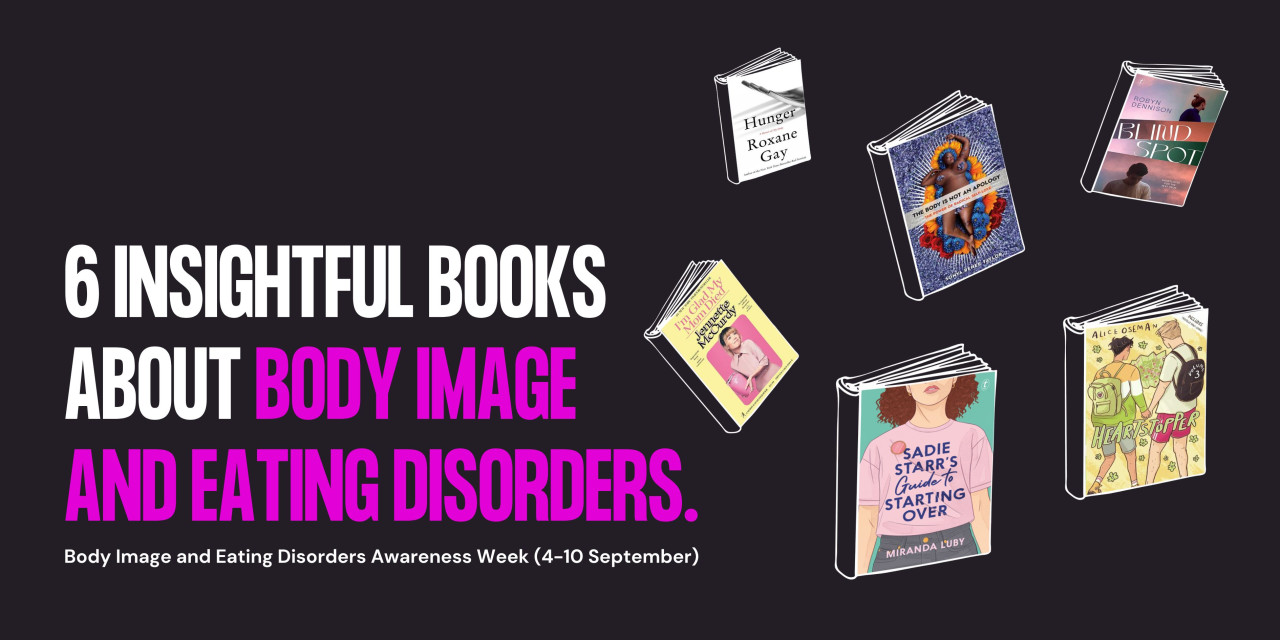The SANE Blog
Six insightful books about eating disorders and body image
Books are a special kind of magic.
Reading can help us to step into the minds of other people, both fictional and non-fictional. When it comes to mental health, reading about other people’s experiences can allow us to understand ourselves more, and to feel less alone.
As part of Body Image and Eating Disorders Awareness Week, we’re sharing six touching books on this topic. We’ve included some popular books and some that are not so well known. This is not an exhaustive list; there are hundreds of amazing books out there!
A quick note: please be mindful that many of these books contain explicit discussions around disordered eating, weight, body image, and trauma. We encourage you to pick up these books only if you’re in the right mindset to read about these topics. The links provide more information about content warnings submitted by readers, if you would like to learn more about the topics to expect.
Non-fiction books
Actor and writer Jennette McCurdy’s acclaimed memoir shines a light on the disturbing side of child stardom and her complicated relationship with her overbearing mother, who actively encouraged her eating disorder.
Weaving together raw emotion with moments of dark humour, McCurdy talks about her experiences with anorexia nervosa and bulimia nervosa, an unhealthy relationship with alcohol, and obsessive-compulsive disorder. Her recovery journey is non-linear, but hopeful.
In this memoir, Roxane Gay, bestselling author of Bad Feminist, shares insights into her relationship with food, weight, and body image. She highlights how much of her complex relationship with eating and her body is linked to early trauma.
Hunger draws attention to the complicated tensions between desire and denial, and self-acceptance and self-care. Gay speaks with candor and vulnerability about fatphobia, power, and survival.
Sonya Renee Taylor, author, activist, and poet, presents radical self-love as a path to empowerment. In this thought-provoking read, Taylor introduces readers to how body shame is inherently linked with social inequities relating to capitalism, racism, misogyny, and ableism.
It’s no wonder that many readers find The Body is Not an Apology to be both informative and validating.
Fiction books
Sadie Starr’s Guide to Starting Over
Sadie Starr is obsessed with a fresh start: new year, new diet, new friends. When she moves to a new school, life gets complicated fast.
This book provides thoughtful insights into the relationship between perfectionism, control, over-exercising, and disordered eating. Sadie’s experience of binge eating disorder is nuanced and well-written.
Heartstopper Volume 3 and Volume 4
The Heartstopper series is a sweet and earnest depiction of first love between teenagers Nick and Charlie. If you love the Netflix series, you’ll probable love the graphic novels!
Volumes 3 and 4 show Charlie’s experiences as a teenage boy with an eating disorder and body dysmorphia. His experiences are interwoven with bullying and self-harm. His relationship with his support network is particularly touching.
Blind Spot is a newly published novel about Dale, who is struggling with feelings of guilt and shame after failing to intervene after witnessing an assault at a party. Meanwhile, things are tense at home, after his cousin Max moves in. Dale and his father are supporting Max through her recovery from an eating disorder, including supporting mealtimes at home.
Blind Spot covers the challenges many families and carers face when supporting someone managing an eating disorder. Dale struggles with feelings of powerlessness and knowing how and when to help.
Have you read any enlightening books about eating disorders and body image? Comment on our Facebook or Instagram post and let us know! Also, why not check out our other blog piece with recommendations for great books about mental health issues.
If you’re in need of advice or support, we encourage you to call our friends at the Butterfly Foundation on 1800 33 46 73.
SANE provides a range of free telephone and online support services for people over 18 years of age with complex mental health needs and their family, friends and carers. We offer different types and levels of support so you can find what works for you. Choose from counselling, peer support, online groups and events, 24/7 community forums, and online information and resources. Learn more at sane.org/get-support.
When you subscribe to the blog, we will send you an e-mail when there are new updates on the site so you wouldn't miss them.
